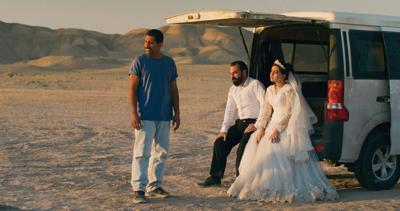Earlier this year we discussed The Seed of the Sacred Fig director Mohammad Rasoulof’s daring escape through the mountains to avoid arrest at the hands of the Iranian government. While Rasoulof’s journey is still a remarkable story, there is something even more defiant about the account of his close friend Jafar Panahi, who decided to stay.
Panahi is no stranger to arrest, having made several films under house arrest, including This Is Not a Film, Closed Curtain and Taxi, the last of which won the Berlin International Film Festival’s Golden Bear prize in 2015. His most recent arrest came in July 2022, when Panahi visited the prosecutor’s office to inquire about Rasoulof’s arrest; he was released in February of the following year after enacting a hunger strike. During this most recent incarceration, Panahi developed the idea for a film — as soon as he was released, he got to work on his latest masterpiece, It Was Just an Accident, which won the prestigious Palme d’Or at this year’s Cannes Film Festival.
Mechanic Vahid (Vahid Mobasseri) kidnaps a man who he believes tortured him (Ebrahim Azizi). As Vahid takes the man to the desert and digs his grave, he experiences a moment of doubt: Does he have the right guy? Vahid decides he needs to be sure. He locks the man in a trunk and takes him to other victims of the notorious Eghbal “The Peg Leg” to verify his identity. As Vahid does so, Eghbal’s survivors are brought face to face with the emotional toll of their imprisonment.
Mohammad Rasoulof’s political thriller opens this week at the Belcourt and AMC Thoroughbred 20
The scars of Panahi’s own imprisonment are all over this film. What on the surface reads as a political thriller also functions as a look inside the director’s mind, with a cast of characters who serve as avatars for an internal debate — like a more complex version of 2015’s Inside Out.The characters all feel inspired by the complicated, nuanced emotions that follow a traumatic experience — there are no simple answers here, and each of these people experiences these emotions differently. The characters are all elevated by Accident’s stellar ensemble cast, with a standout performance from Mariam Afshari as Shiva.
At the thematic core of this film is the Shia Islamic tradition of martyrdom, something that — like many religious concepts — has been weaponized for political means. As seen in films like Ali Abbasi’s Holy Spider, the politicized concept of martyrdom is one that brings glory to extremists. This background is the key to understanding the true nuance of not just this film, but all Iranian New Wave Cinema. Panahi shows that the culture has warped so much that even the concept of taarof — customs of politeness, hospitality and gift giving — has started to contort into cultural bribery and extortion.
The career of Jafar Panahi has been nothing short of incredible. Despite his arrests and punishment, he has still become one of global cinema’s most celebrated directors, winning top prize at some of the biggest festivals in the world and being only the fourth filmmaker to join the elusive “Triple Crown Club”: Along with Henri-Georges Clouzot, Michelangelo Antonioni and Robert Altman, Panahi has won the Golden Bear, the Palme d’Or and the Venice Film Festival’s Golden Lion. He has proven to the world that nothing will silence him — nothing will prevent him from creating powerful films.






